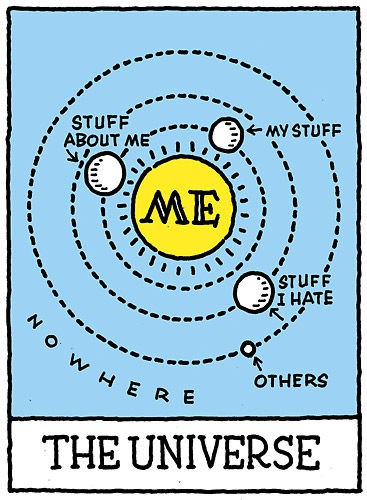Do you know somebody who must ALWAYS be the center of attention? And does this person try to "up-one" others in a conversation? You might be head to head with a bonafide narcissist.
At first, a narcissist seems like they would be easy to spot. Think about the jerk bragging or boasting in the break room or at the gym. But, in reality, narcissists can be quite attractive with their charismatic and entertaining personalities.
By definition, a narcissist is a person who is excessively interested in themselves. Here are a few tell-tale signs of a narcissist:
- They need attention. A narcissist is driven by positive attention from other people. They want - even need - to be admired. They relish flattery. Their need for praise borders on addiction. Oftentimes, a narcissist will adopt a new social circle in order to get their "fix" of praise and admiration.
- They love the sound of their own voice. A narcissist loves everything about themselves - even how they sound. Conversations with a narcissist tend to very one-sided because they really don't care what is going on with you. Remember, it's all about them!
- They are selfishness. A narcissist is a self-centered and self-serving. They do not see value in other people unless those others are serving the narcissist in some capacity.
- They are confident and flamboyant. A narcissist will seek to stand out in a crowd and are absolutely sure that they are the most attractive person at any event. They will often wear expensive, flashy, or provocative clothing to make sure everybody notices them.
- They don't apologize. By now you may have gathered that narcissists do not think that they are wrong about anything. Therefore, it goes without saying that a narcissist does not feel the need to apologize regardless of the obvious problems that they cause. In fact, it isn't at all unusual for a narcissist to turn the entire situation around and make it somebody else's fault.
- The hate to lose. A narcissist is always up for a good competition, but they do not handle defeat well.
- They hate to listen to others. As mentioned, narcissists are totally blinded by their own ego. Therefore, any conversation with another person will result in the narcissist turning the topic back around to their favorite topic - themselves.
Now you have an idea of what a narcissist is how they behave. Basically, a narcissist is somebody obsessed with themselves. In their eyes, the universe makes a circle because of them and nothing else really matters. At first, a narcissist may appear to be interesting and appealing - even sexy. But the person dealing with a narcissist will soon discover otherwise. A narcissist is only out to serve themselves.




 Original Articles. Constant-Content.
Original Articles. Constant-Content.